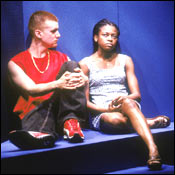
True style is the seamless blend of the natural and the artful, which is what Elaine Stritch, with a constructional assist from John Lahr and a directorial one from George C. Wolfe, consummately delivers in Elaine Stritch at Liberty. Here the persons unseen are as present as the one seen, and the protagonist’s life, onstage and off, proves rich enough in adventure and misadventure, achievement and setback, fallibility and triumph, to fill the biggest stage, fulfill the most exacting expectations.
First, there is the cogent fusion of narration and song. Stritch’s storytelling and singing are not separate entities; they flow into each other almost imperceptibly. The blend is possible because, by her merrily mercurial delivery, Stritch can make speech sing, just as her speechlike naturalness in singing makes song feel like self-baring conversation. It is all varicolored wool melding into a single tapestry.
Next, the mastery of emphasis, rhythm, and pause. Stritch can wax almost grotesquely histrionic, yet carry it off with conspiratorial facial play, infectious body language. Hyperbole becomes not hamming but metaphor. Sudden changes – from loud to soft, lento to presto, or vice versa – keep us on our toes, increasingly aware that the tempo is the message, that acceleration and retardation are the music of living. And those pauses that might give Pinter envious pause are the interstices wherein thought can catch up with the meaning of action.
Finally, there is that barstool, the show’s sole prop, enhancing the speaker’s eloquence. Confidently perching or restoratively leaning on it, emphatically plunking it down or cannily relocating it, blithely ignoring it or stymiedly crumpling up over it, Stritch makes the high chair embody moods, objectify states of being. Everything here is finely conceived, calibrated, communicated. It is in this net of calculation that truth is captured, even as the crafty machinations of the camera yield, in the right hands, the unarguable spontaneity of the snapshot.
Misunderstood white boy, 16, is growing up gay. (That his parents named him June helps.) Abigayle, 16, neglected black girl (mother permanent invalid, father mostly absent), is growing up promiscuous. June picks up a much older mate, Joe, via e-mail. Abigayle reluctantly goes on a date with Dexter, a half-white, half-Hispanic boy she doesn’t like. It is the Fourth of July and anything can happen, even in Hartford.
Instead, whatever happens in Christopher Shinn’s Four is humdrum. The dubious points of interest are that the couples are interracial, that one of them is homosexual, and that Joe is Abigayle’s father. Both couples have sex. In the end, June and Abigayle stand alone, forlornly gazing at a sky where the budget does not seem to allow for a fireworks display.
Although sexual acts are suggested, we get only a couple of quasi-daring moments. The boldest thing here is that in both cases intercourse is initiated by the less likely partner – June or Abigayle – and that the theoretical aggressor is somewhat (Joe) or very much (Dexter) taken aback. Even so, all this is tame stuff, and though tame is not bad, trivial is.
Jeff Cohen, the director, has taken minor liberties. The text calls for Joe’s parting gift to be a box of condoms and a sparkler. The production omits the sparkler (fire laws or making everything else dim by comparison?) and substitutes a copy of Huckleberry Finn (redeeming social content?). The performances of Pascale Armand, Armando Riesco, and Keith Nobbs cannot be faulted; as Joe, Isiah Whitlock Jr. is outstanding, managing even those tricky convulsions midway between laughter and sobs. Lauren Helpern’s abstract set and Traci Klainer’s stylized lighting contradict the realistic dialogue. It is hard to tell whether the four characters or the four chairs (the principal scenic element) are more involving.
Elaine Stritch at Liberty
Stritch’s solo show moves to Broadway.
Four
By Christopher Shinn.